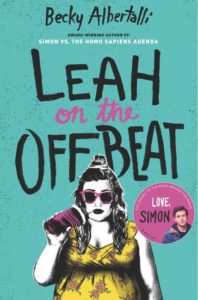
In Simon vs. the Homo-Sapiens Agenda, the only thing worse than the title was the character of Leah. Leah got angry at Simon for no reason on more than one occasion, and her motivations were entirely shadowy from start to finish. She was the least defined of the entire Simon crew and the least worthy of the reader's attention. Leah existed to make Simon feel bad, and he had enough to feel bad about in the first place.
A book is the crystallisation of a moment in time. To add anything to that runs the risk of disturbing the balance of the original story. In Leah on the Offbeat, Becky Albertalli, answering the call of "the readers who knew something was up, even when I didn'tâ€, has written a novel solely to pander to fans of an obscure "shipâ€. The balance has been disturbed.
It's the final year of high school for the students of Shady Creek, and Leah Burke is having trouble coming to terms with the impending disbandment of her group of friends. She's also having difficulty telling her friends that she's bisexual – a fact that she knows that she will literally receive no pushback from – and telling herself that she has feelings for one of them.
To make an entire book told in the voice of a character who doesn't like anyone, least of all herself, is a bad idea. Albertalli experimented with a character battling self-loathing in The Upside of Unrequited, but Molly Suso had at least the good grace to internalise her issues instead of externalising them to everyone around them. We're expected to believe that Leah likes some people and calls them "cinnamon rolls†– at this point a truly dusty Tumblrism – but this is just reflexivity on Albertalli's part. Leah calls herself an "asshole†all the time, but she doesn't do anything to change this fact. This is a character entirely opposed to growing and changing, who is constantly in the throes of self-pity. It gets old, fast.
Leah gives no one reason to enjoy her company, and yet the other characters are drawn to her. It may be inertia for those who have been caught in her orbit for years, but it's inexplicable in a newer transplant like Abby. Leah pays basic lip service to her mother, but is needlessly cruel to and about her mother's boyfriend, whose only crime appears to be dating Leah's mother. We're not given any reason in the body of the text to like or dislike anyone except on Leah's say so, even though it is clear that her judgement is completely lacking.
This carries on across the ensemble of characters … especially the ones that no one remembers from Simon vs. the Homo-Sapiens Agenda, Morgan and Anna. With Morgan and Anna, Leah has a domineering self-righteousness that endears her to no one. Worse than this is a tirade that she goes on against Abby about the taxonomy of sexuality, as if Leah herself was an expert. Apart from there being a sliding scale going back at least as far as Kinsey, nobody needs this seventeen year old girl's lectures.
If Simon has had his story told, Albertalli mercifully sees little reason to advance it further. He falls into the background, and provides the novel's one grace note: a pop culture reference that isn't Harry Potter. There's an entire plot thread about Abby reading Harry Potter for the first time and being told "You can't just like Harry Potter. You have to be balls-out obsessed with it.†That Simon gets to be a Love, Actually fan means that there's at least one more thing in the world for these characters, and that's the only relief we get. If you read enough (too much?) Young Adult fiction, it becomes incredibly clear that only one franchise has ever been consumed by its characters. It's the Ernest Cline dilemma inverted.
The rest of the returning ensemble isn't as lucky as Simon. If you liked the character of Nick in the first one, prepare for him to be ground under Albertalli's boot as a drunken buffoon (the literal version of that would please a different sort of fan). If you wanted Abby to be a wishy washy person incapable of expressing herself … something like a mirror of Leah … you get exactly that.
What little story there is is driven by Leah's inactivity … and it says a lot that the paralysis of a teen's self-doubt becomes irritating rather than being a source of sympathy … and it all culminates in a conclusion that the characters themselves acknowledge is a bad idea. It's okay, though: Albertalli can write another book … maybe this time about Martin, who is somehow completely invulnerable to consequences … and show that everything she's set up here can be undone too.
Leah on the Offbeat was written as fan service, but the thing about fans is that while some of them are rabid, others are discerning critics who are more likely to find issue with the flaws in the things that they want to love. Like Leah Burke herself, Leah on the Offbeat is a thoroughly unlovable novel.

